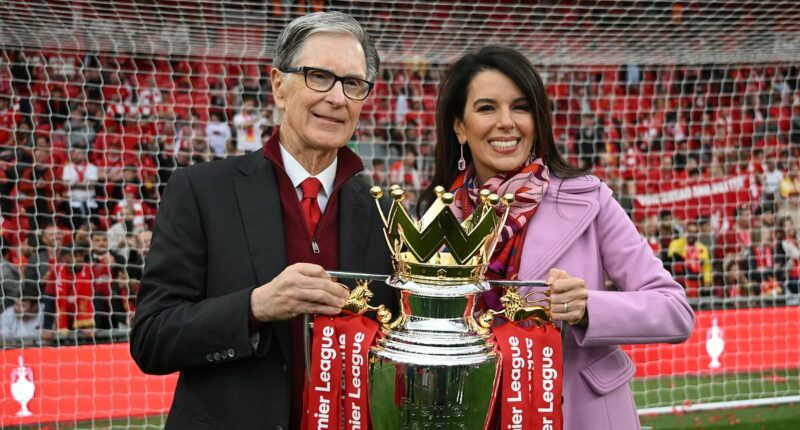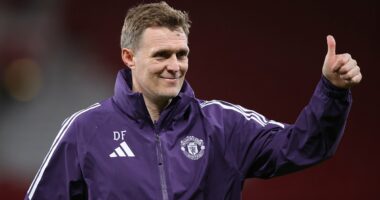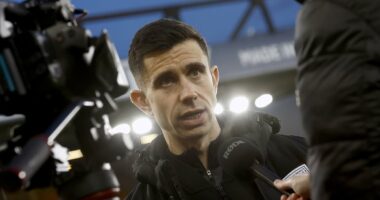Share this @internewscast.com
From the outset of their tenure at Anfield, Liverpool’s American owners faced the looming threat of vast Gulf state wealth and the challenge of matching up to it.
I remember when, nearly 15 years ago, John W Henry of Fenway Sports Group sat down with us in the boardroom and explained, “I don’t have ‘Sheikh’ before my name.” His point was that without a strict system overseeing the influx of funds from Gulf states into football clubs, competing would be incredibly difficult.
There were longstanding beliefs that achieving success against Gulf state powerhouses, like those at Manchester City and Newcastle, would be an insurmountable challenge for FSG. The strategically-minded and exceptionally wealthy groups in Abu Dhabi and Saudi Arabia seemed to make the American approach of growth through smart management appear futile.
Liverpool’s financial muscle hasn’t matched that of City or Newcastle, both of which have the advantage of Gulf state sponsorships. However, FSG has stayed ahead by emphasizing a robust player recruitment system over sheer spending power.
This has included pioneering a data-driven, ‘Moneyball’ strategy in player acquisition—something the Gulf clubs have not matched. From the beginning, Henry was personally involved in bringing onboard data specialists, Michael Edwards and Ian Graham, to maximize value in the transfer market.
But success has also come from hiring the right combination of manager and director of football to make that approach work.
Graham’s excellent book from last year, “How to Win the Premier League,” provides a harsh look at how Brendan Rodgers, FSG’s first manager, resisted this analytical framework. Rodgers’ push to sign Christian Benteke, despite clear evidence against the move, significantly contributed to his dismissal in 2015.

Liverpool owner John W Henry’s belief in the use of data has led to a period of significant success for the club

Sporting director Michael Edwards (middle) has played a key role in developing the club’s player acquisition system

Club chiefs were unconvinced a deal for Christian Benteke in 2015 was the right option for the club – and ultimately manager Brendan Rogers paid the price
Jurgen Klopp was recruited because he was willing to adhere to the structure. Klopp’s key partner, as Graham’s book makes plain, was Edwards – the man universally known around the place as ‘Eddy’ – who had become sporting director by the time he left Anfield in 2022.
Liverpool’s failure to maintain their level after winning the Premier League in 2020 stemmed to a substantial degree from the temporary weakness in a system designed to hold on to the best players and sign the prime targets.
Julian Ward replaced Edwards, only to leave the club himself, and Jorg Schmadtke, a long-time friend of Klopp’s took over as a stand-in. It looked like a system in flux until Edwards was re-hired in a new role as chief executive of football, with Bournemouth’s technical director Richard Hughes promptly signed as a new sporting director.
While Liverpool brought an end to their period of system failure, both City and Newcastle look like clubs in need of a firmer grip on their own.
Having abruptly lost sporting director Dan Ashworth to Manchester United after a relationship with Eddie Howe which was not smooth, Newcastle signed and parted company with Paul Mitchell, the man who withdrew the Isak contract offer that former Newcastle director Amanda Staveley had put on the table. Newcastle are now using recruitment firm Nolan Partners to search for their third sporting director.
City have undoubtedly been suffering from the loss of their own director of football Txiki Begiristain, friend, confidante and soulmate of Pep Guardiola. They have the Portuguese Hugo Viana, though there is no sense yet that he matches Begiristain, a jovial life force and beating heart at the Etihad.

Newcastle’s spending under Yasir Al-Rumayyan, governor of the Saudi Public Investment Fund, has been restricted by PSR challenges since the club were taken over in 2021

Txiki Begiristain’s departure from Man City has left a huge void at the club

Hugo Ekitike was identified as a player capable of helping Liverpool to defend their Premier League title and has hit the ground running in England
The consequences of Liverpool’s superior system have been evident. A summer transfer window which has brought in the targeted players – including Hugo Ekitike, a revelation, and Florian Wirtz, who will develop – and the capacity to respond to the opportunity presented by Isak’s disenchantment on Tyneside.
It has become a virtuous circle of success on Merseyside: commercial and footballing growth generating the revenue to spend.
Henry said on that bright October day at Anfield in 2015 that they were looking to use a different kind of business model to find success. ‘We have to be smart,’ he told us. ‘We have to be more efficient.’
They’ve been as good as their word.












